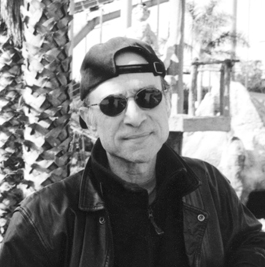home | metro santa cruz index | the arts | visual arts | review

Photograph by Daniela Hurezanu
Through Glasses Darkly: Stephen Kessler reads from his new book of poetry this Thursday, inaugurating WEST's new literary arts program.
The Slow Burn
In 'Burning Daylight,' Santa Cruz poet Stephen Kessler continues a lifelong devotion to craft.
By Jean Stirling
The only poetry that matters—and the only art that matters—comes out of necessity," he said, a book bag bulging at his hip. The bag opened to reveal sleek volumes of poetry—among them After Modigliani, Tell It to the Rabbis, Machu Picchu and, hot off the presses, Burning Daylight. "For me, poetry is more a vocation than a profession." Stephen Kessler's calling has assumed many forms over four decades and thousands of pages. Chief among these is translation. From his undergraduate days at Bard College in upstate New York, he has accepted commissions to translate poetry from Spanish—notably works of Jorge Luis Borges, Fernando Alegria, the 2004 Lambda award-winning translation of Luis Cernuda's Written in Water, and perhaps most definitively, four volumes of the poetry of Pablo Neruda.
It is Kessler's translation of Neruda's epic "Heights of Machu Picchu" that provides the text—with prologue by Isabel Allende—for the book bag's handsome Machu Picchu, in which the words are partnered with Barry Brukoff's luminous photographs of the ancient site in Peru. "Neruda is impossible," says the translator. "To render Neruda's poetic, musical, emotional composition in English, it's necessary to convey the visceral quality of his writing, to enter into not only the rhythm but the tumultuous energy of his genius, the volcanic imagination that pours out in an incantatory rhythm, a powerful rhetorical momentum. The essence of translating poetry is to feel the subtext, the necessity of the poet's words."
It raised up a hand that came down hard/ From the heights to the bottom of time
Kessler's translation of Neruda's masterpiece is an epic work of poetry itself. I compared another version from my own dog-eared anthology of Neruda's works. For the first time I grasped the impossibility, and recognized the achievement.
And you, were you too the little broken piece/ of disconnected man, of starving eagle/ who in the routines of the daily streets/ who in the dry leaves of a dying autumn/ grinds down his soul all the way to the grave?
The Kessler translation channels Neruda's incandescent imagery in a sure and flowing rhythm, while the other version from my anthology stammered, literally. "I really want to contribute something to literature that would otherwise not be available. There are very few who translate poetry well. I do have a gift for that," Kessler says.
As translator, poet, essayist, columnist, critic, literary journalist, founder of The Sun weekly that prospered in Santa Cruz until 1989 when the earthquake shook all foundations, founder and still editor of the literary journal Redwood Coast Review (the current issue of which includes a fan letter from National Endowment for the Arts chairman Dana Gioia), Kessler admits that his writing life has many facets. But, he says, "The core of it all is poetry."
Within a few crisp volumes I have just met three decades of Stephen Kessler and cannot claim to know him, yet I begin to recognize the essential prosody of his work—the intonation and rhythm of his free verse—as organic and uncontrived but at the same time painstakingly crafted. His subjects are as diverse as observations about a landscape seen from a train, a memento mori at ground zero, love, sex, flamenco, dinner.
"When I was 20 I wrote a poem every day. ... I wrote a lot of bad poems," he says. "Now at 61, a poem will only begin if I think it must ... maybe an insistent line or phrase in my head that I follow to its natural conclusion, see if there's anything going on there, discover what I don't know yet. ... I let the language lead me."
Kessler introduces his latest book, Burning Daylight, at a Jan. 24 reading followed by a booksigning and reception that also launches the Literary Arts programs of the ambitious new West End Studio Theatre (WEST) at its Ingalls Street studio in Santa Cruz. WEST serves youth and adults primarily as a performing arts training ground and creative playground.
"Our dramatic work is based on literature," says Ronn Reinberg, facility manager and longtime mentor within Santa Cruz County's performing arts community. "We do our own adaptations from children's literature and with this event are launching our formal Literary Arts program, which will include workshops."
The first workshop, taught by Kessler, is on Sunday, Jan. 27. Its title seems an apt fit for the experienced and thoughtful writer: "Why Write Poems—and How."
STEPHEN KESSLER reads from his new book of poetry, 'Burning Daylight,' on Thursday, Jan. 24, at 7pm at the West End Studio Theatre, 402 Ingalls St., Santa Cruz. His two workshops are on Sunday, Jan. 27 ($50 both). For more info call 831.425.9378 or visit www.westperformingarts.com.
Send a letter to the editor about this story.
|
|
|
|
|
|